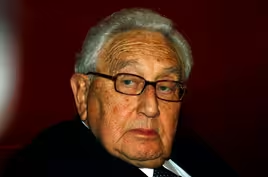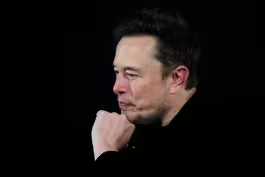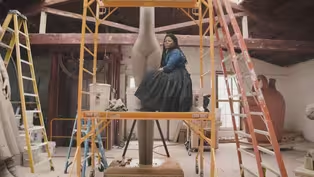
COP28 opens amid skepticism world will move from fossil fuel
Clip: 11/30/2023 | 10mVideo has Closed Captions
U.N. climate conference opens amid skepticism world will move away from fossil fuels
The United Nations Climate Conference, COP28, began Thursday in the United Arab Emirates. Negotiators from nearly 200 countries are hoping to hammer out agreements to limit the pollution that’s warming the planet, and to agree on aid for the nations most impacted by climate change. William Brangham reports.
Problems playing video? | Closed Captioning Feedback
Problems playing video? | Closed Captioning Feedback
Major corporate funding for the PBS News Hour is provided by BDO, BNSF, Consumer Cellular, American Cruise Lines, and Raymond James. Funding for the PBS NewsHour Weekend is provided by...

COP28 opens amid skepticism world will move from fossil fuel
Clip: 11/30/2023 | 10mVideo has Closed Captions
The United Nations Climate Conference, COP28, began Thursday in the United Arab Emirates. Negotiators from nearly 200 countries are hoping to hammer out agreements to limit the pollution that’s warming the planet, and to agree on aid for the nations most impacted by climate change. William Brangham reports.
Problems playing video? | Closed Captioning Feedback
How to Watch PBS News Hour
PBS News Hour is available to stream on pbs.org and the free PBS App, available on iPhone, Apple TV, Android TV, Android smartphones, Amazon Fire TV, Amazon Fire Tablet, Roku, Samsung Smart TV, and Vizio.
Providing Support for PBS.org
Learn Moreabout PBS online sponsorshipNegotiators from nearly 200 countries are hoping# to hammer out agreements to limit the pollution## that's warming the planet and to agree on aid# for the nation's most impacted by climate change.
William Brangham joins us for# a preview of what's to come.
Good to see you, William.
WILLIAM BR What are negotiators specifically# hoping to work out in this one in Dubai?
WILLIAM BRANGHAM: The backdrop# for all of this is that we are## living through the hottest year# ev And that warmer world creates havoc# all over the planet in extreme events,## drought, fire, floods.
That# costs billions of dollars,## and that kills people.
And so the whole goal of# this summit, in essence, is to stop Now, there's a new focus that's been# happening this year and in recent years,## which is, what is the responsibility that# the developed world that is re sponsible for climate change, what does the# developed world owe to the developing world## that is suffering the impacts of climate# change, who did nothing to cause this?
And there was some news today.# There was a fund for the first## time established to try to offer some# aid to those n AMNA NAWAZ: So we know we# cannot meaningfully address## climate change without reducing fossil fue without moving towards renewable energy.
Pledges# and plans have How are the nations doing on those?
WILLIAM BRANGHAM: Not great, in short.
I mean, U.N. Secretary about wealthy nations that talk a good# game and fail to deliver.
The fact is,## is that that progress is not# happening nearly quickly enough.
The hard part is that we live in a fossil fuel# world, I mean, every single thing the lights, this table, the concrete on this# floor, how we got to work, all powered by fossil## fuels.
And transitioning away from that is costly# and complicated, and it's a hard thing to do.
Now, that transition is happening.# Renewable energy is coming on like## gangbusters, as my mom likes to say.
(LAUGHTER) that this cost of inaction is# an unacceptable cost to pay.
AMNA NAWAZ: This one summit was also beset by## controversy before it even# began.
What ha WILLIAM BRANGHAM: People argue, why are# you having a climate change conference## in a state known, in a nation# known for exporting oil and gas?
The president of the current COP, Sultan Al Jaber,## is an oil executive in the UAE.
And so# people argue this is a classic ex the fox guarding the henhouse.
The BBC and# the Center for Climate Reporting reported## that he was found trying to make oil and# gas deals in the lead-up to this event.
So people are dubious of what might come out of# this.
And, recently, earlier this week, I tried## to get some context for all of this.
And I spoke# to Christiana Figueres, who is a veteran of these## prior U.N. climate talks.
And we began talking# about this controversy about the COP president.
CHRISTIANA FIGUERES, Former Executive Secretary,## the COP presidency has fra its responsibility, and its accountability# with which they are leading this process.
Now, from a planetary perspective, frankly,## we cannot afford for them not# to do so.
That's where we are.
WILLIAM BRANGHAM: Jaber certainly says# that he appreciates that there has to## be a transition away from fossil fuels,# that we have to cut emissions 50 percent in the next few years, that# he seems to argue that he is uniquely## positioned to help lead this COP and help# lead the world in those emissions reductions.
CHRISTIANA FIGUERES: And we all need him# to do that.
That is exactly right.
We all## need him to do that.
And we have -- none --# no one can afford for him to waver on that.
So, yes, I would totally agree that that is# his job.
That is his responsibility.
And if## he really sets his head to it, he can do# it.
He is a very, very intelligent person.
WILLIAM BRANGHAM: You and many# others have argued that if we## continue on our current path, that we ar to an increasingly unlivable planet,# of famine and disease and conflict.
Do you worry that the sense of# urgency on that front is diminishing?
CHRISTIANA FIGUERES: We humans have a very## interesting contrasting reaction# to acute and to chronic situations.
We react pretty well when there is a chronic --# or we react pretty well when there is an acute## threat.
That hits us, hits us really hard,# and then we address it, and then we pass.
What -- a pandemic being a pretty good case# in point.
We are absolutely terrible about## dealing with chronic threats, despite the# fact that they may be life-threatening.## But if they're chronic and sustained# over time and gradually hitting us,## we're just terrible at that.# We can't deal with that.
And so the new muscle that we have to exercise# here is, how do we deploy those measures and## that decision, that commitment that we bring# to acute threats, to get through acute threats,## how do we deploy it for chronic threats?# That is the lesson that we have to learn.
WILLIAM BRANGHAM: The war in Ukraine# certainly sent an incredible shockwave## through the energy industry.
There's# concern that what's happening in the## Middle East right now with Israel# and Gaza could also spread wide Do you share the concern that the# tumult in the energy market pushes the## commitment to renewables and the green energy# transition to the side or to the back burner?
CHRISTIANA FIGUERES: No, to the# contrary, I was -- I was -- William,## I thought you were going to end that sentence# completely in the opposite direction.
The worry about energy dependence pushes countries# toward domestic energy production that, by and## large, is actually renewable energy direction.# And that, we have seen.
Since the war in Ukraine,## we have seen investment into renewable# energies worldwide go up.
Two years ago,## we had $1 trillion invested in# fossil fuels, still, oh, my God.
This year, we still have $1 trillion# invested into oil and gas and $1.7## trillion into renewables.
Why?# Because that actually strengthens## energy independence.
That strengthens# security, strategic national security.
And so, though the invasion of Ukraine is a# tragedy and completely cannot be justified## under any account, absolutely, and it has had# a very interesting accelerating effect on the## energy system of the world.
It has accelerated# the decarbonization of the energy system.
WILLIAM BRANGHAM: On that revolution in# renewable and green energy that is under way,## as you say, what is it that most gives# you hope when you look at that industry?
I mean, wind and solar, prices# are dropping and production is## going up.
What gives you the most# hope when you look at that field?
CHRISTIANA FIGUERES: That is# exactly what gives me hope,## the fact that this is no longer linear the exponential curves, of all# of those solution technologies.
Wind is definitely on an on exponential# curve, solar definitely, batteries definitely,## E.V.s getting there very, very quickly, already# showing that initial indication of being on## that -- on that curve.
So what gives me hope is# the fact that the technologies that can help us to## reduce greenhouse gas emissions are on exponential# curve of improvement, development, and deployment.
That, of course, means that we are,# frankly, on a race here between two## exponential curves, the exponential curve# of solutions, which I have just described,## but also the exponential curve of the# negative effects that we're seeing.
So,## we are seeing two exponential curves that,# in my book, are racing against each other.
When they're going to intersect, we# don't know.
But we do know which of## those exponential curves has to win the race.
WILLIAM BRANGHAM: Christiana Figueres, thank# you so much for taking the time to tal CHRISTIANA FIGUERES: Thank# you, William.
Good to see you.
A look at the controversial legacy of Henry Kissinger
Video has Closed Captions
Clip: 11/30/2023 | 8m 21s | A look at the consequential and controversial legacy of Henry Kissinger (8m 21s)
Musk lashes out at advertisers leaving X over hate speech
Video has Closed Captions
Clip: 11/30/2023 | 5m 46s | Musk lashes out at advertisers leaving X over rise in hate speech (5m 46s)
Simone Leigh's art explores misrepresentation of Black women
Video has Closed Captions
Clip: 11/30/2023 | 5m 43s | Simone Leigh's work explores how Black women have been misrepresented in art and culture (5m 43s)
Students lobby Hawaii schools to provide menstrual products
Video has Closed Captions
Clip: 11/30/2023 | 3m 28s | How Hawaii students convinced schools to provide free menstrual products (3m 28s)
UNICEF leader on Israel-Hamas war's impact on children
Video has Closed Captions
Clip: 11/30/2023 | 7m 11s | UNICEF leader describes Israel-Hamas war's brutal impact on children in Gaza (7m 11s)
Providing Support for PBS.org
Learn Moreabout PBS online sponsorship
- News and Public Affairs

FRONTLINE is investigative journalism that questions, explains and changes our world.

- News and Public Affairs

Amanpour and Company features conversations with leaders and decision makers.












Support for PBS provided by:
Major corporate funding for the PBS News Hour is provided by BDO, BNSF, Consumer Cellular, American Cruise Lines, and Raymond James. Funding for the PBS NewsHour Weekend is provided by...




